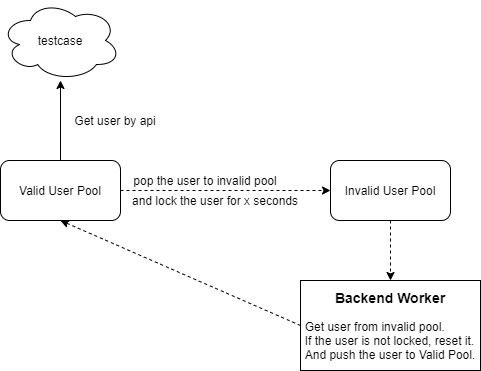1
2
3
4
5
6
7
8
9
10
11
12
13
14
15
16
17
18
19
20
21
22
23
24
25
26
27
28
29
30
31
32
33
34
35
36
37
38
39
40
41
42
43
44
45
46
47
48
49
50
51
52
53
54
55
56
57
58
59
60
61
62
63
64
65
66
67
68
69
70
71
72
73
74
75
76
77
78
79
| """DO NOT COPY DIRECTLY !
You need make the code more robust before use it.
"""
import flask
from flask import Flask
import redis
from flask_apscheduler import APScheduler
ValidPool = 'xpool:valid'
InvalidPool = 'xpool:invalid'
LockKey = 'xpool:lock_{xid}'
class Config(object):
JOBS = [
{
'id': 'job',
'func': 'scheduler:reset_worker',
'trigger': 'interval',
'seconds': 5
}
]
SCHEDULER_API_ENABLED = True
app = Flask(__name__)
app.config.from_object(Config())
scheduler = APScheduler()
scheduler.init_app(app)
scheduler.start()
redis = redis.Redis(host='127.0.0.1', port=6379)
@app.route('/api/get', methods=['GET'])
def get():
args = flask.request.args.to_dict()
duration = int(args.get('duration', 30))
xid = redis.spop(ValidPool)
if not xid:
return {'status': 1, 'msg': 'get nothing in pool'}, 200
lock = LockKey.format(xid=xid)
redis.setex(name=lock, time=duration, value='1')
redis.sadd(InvalidPool, xid)
return {'status': 0, 'xid': xid}, 200
def reset(xid):
print('reset xid: {}'.format(xid))
return
def reset_worker():
xid_list = redis.smembers(InvalidPool)
if not xid_list:
return
for xid in xid_list:
lock = LockKey.format(xid=xid)
if redis.get(lock):
continue
reset(xid)
redis.srem(InvalidPool, xid)
redis.sadd(ValidPool, xid)
return
if __name__ == '__main__':
app.run(port=8001)
|

